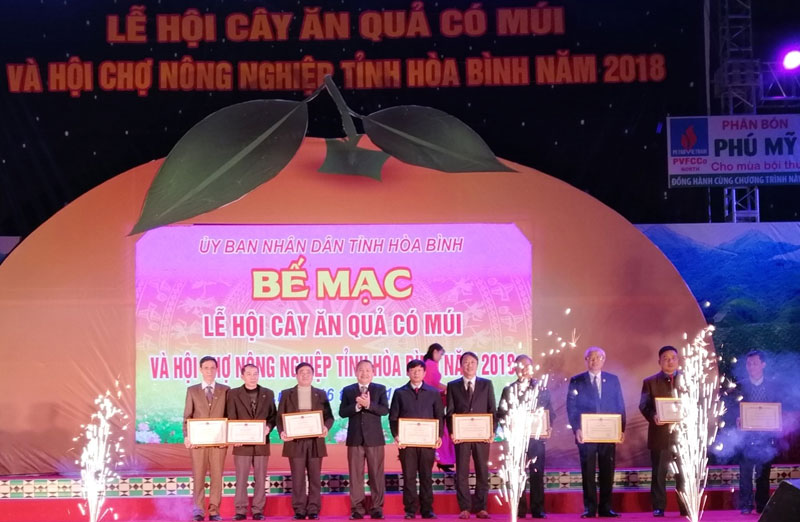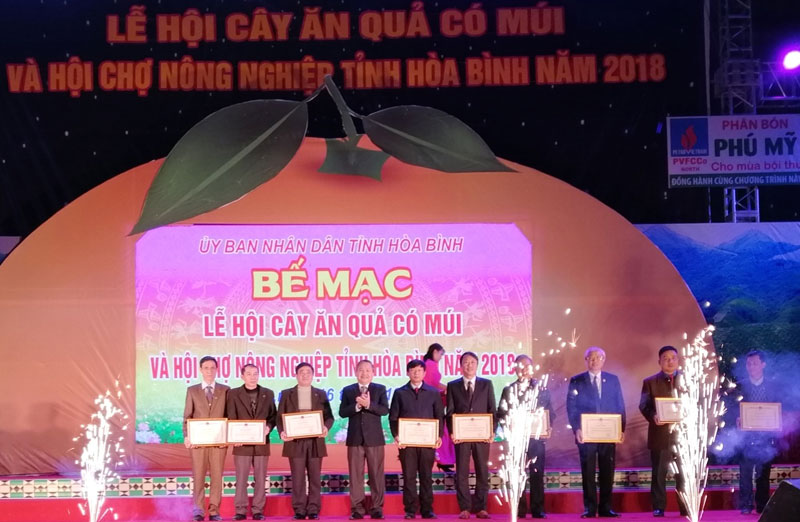
HBO – The People’s Committee of Hoa Binh province has held a ceremony to wrap up the Hoa Binh Citrus Festival and Agricultural Fair 2018 at Cao Phong district’s cultural house in Cao Phong township.
Taking place from December
12-16, the festival and fair were a success, with nearly 200 local units,
organisations, enterprises and households displaying their products at 244
booths.

Vice Chairman of the provincial People’s Council Dinh Van Duc
presents certificates of merits to units and individuals for their outstanding
contributions to organisation work.
In unfavourable weather,
this year’s festival and fair still attracted a huge number of visitors, at
70,000 arrivals. Programmes were organised well, while security and order as
well as food safety and hygiene were ensured, and pavilions provided abundant
goods with stable quality and prices, meeting locals’ consumption demand. In
five days, over 5,000 tonnes of vegetables and fruits of all kinds were sold. On
December 12 – the opening day alone, the events attracted the participation of
around 15,000 visitors, and sales of products were estimated at 60 tonnes,
earning 1.2 billion USD. In addition, sales of citrus in Cao Phong district and
several other districts are on uptrends before, during and after the festival.
On this occasion, the
provincial People’s Committee granted certificates of merits to five
collectives and nine individuals, the provincial Department of Agriculture and
Rural Development presented certificates of merits to 30 collectives and 25
individuals, and the Cao Phong district People’s Committee granted certificates
of merits to five collectives and 25 individuals. Moreover, outstanding
pavilions were also honoured at the closing ceremony./.
According to data from the Hoa Binh Provincial Party Committee, the industrial production index for the first six months of 2025 is estimated to have increased by 20% compared to the same period last year. This marks the highest year-on-year growth rate for this period since 2020.
In the first six months of 2025, Hoa Binh province’s export turnover was estimated at 1.145 billion USD, marking an 18.11% increase compared to the same period in 2024. Import turnover was estimated at $ 804 million, a 17.15% increase, which helped the province maintain a positive trade balance.
The lives of the ethnic minority farmers in Tan Lac district have gradually improved thanks to the new directions in agricultural production. This is a testament to the collective strength fostered through the professional associations and groups implemented by various levels of the district’s Farmers’ Union.
With the motto the "product quality comes first,” after nearly one year of establishment and operation, Muong village’s Clean Food Agricultural and Commercial Cooperative, located in Cau Hamlet, Hung Son Commune (Kim Boi district), has launched reputable, high-quality agricultural products to the market that are well-received by consumers. The products such as Muong village’s pork sausage, salt-cured chicken, and salt-cured pork hocks have gradually carved out a place in the market and they are on the path to obtaining the OCOP certification.
In the past, the phrase "bumper harvest, rock-bottom prices" was a familiar refrain for Vietnamese farmers engaged in fragmented, small-scale agriculture. But today, a new spirit is emerging across rural areas of Hoa Binh province - one of collaboration, organisation, and collective economic models that provide a stable foundation for production.
Maintaining growing area codes and packing facility codes in accordance with regulations is a mandatory requirement for agricultural products to be eligible for export. Recently, the Department of Agriculture and Environment of Hoa Binh province has intensified technical supervision of designated farming areas and packing facilities to safeguard the "green passport" that enables its products to access international markets.



